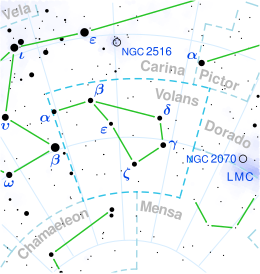
| |
| Observation data Epoch J2000.0 Equinox J2000.0 | |
|---|---|
| Constellation | Volans |
| Right ascension | 09 02 26.79592 |
| Declination | −66° 23′ 45.8727″ |
| Apparent magnitude (V) | +4.00 |
| Characteristics | |
| Spectral type | kA3hA5mA5 V |
| U−B color index | +0.13 |
| B−V color index | +0.14 |
| Astrometry | |
| Radial velocity (Rv) | +4.9 km/s |
| Proper motion (μ) | RA: −2.00 mas/yr Dec.: +95.51 mas/yr |
| Parallax (π) | 26.11 ± 0.12 mas |
| Distance | 124.9 ± 0.6 ly (38.3 ± 0.2 pc) |
| Absolute magnitude (MV) | +1.60 |
| Orbit | |
| Period (P) | 0.652 ± 0.001 yr |
| Semi-major axis (a) | 0.0321 ± 0.0013″ |
| Eccentricity (e) | 0.041 ± 0.038 |
| Inclination (i) | 101.9 ± 2.3° |
| Longitude of the node (Ω) | 105.3 ± 1.4° |
| Periastron epoch (T) | 2015.593 ± 0.063 |
| Argument of periastron (ω) (secondary) | 248.5 ± 34.2° |
| Details | |
| Mass | 1.87 M☉ |
| Radius | 1.9 R☉ |
| Surface gravity (log g) | 4.09 cgs |
| Temperature | 8,198 K |
| Metallicity | +0.19 dex |
| Rotational velocity (v sin i) | 30.6±0.4 km/s |
| Age | 427+183 −377 Myr |
| Other designations | |
| CPD−65°1065, FK5 343, GJ 333.3, HD 78045, HIP 44382, HR 3615, SAO 250422. | |
| Database references | |
| SIMBAD | data |
Alpha Volantis (Alpha Vol), Latinized from α Volantis, is a binary star system located in the southern constellation Volans. It has an apparent visual magnitude of +4.00, which is bright enough to be seen with the naked eye. Based upon parallax measurements made with the Hipparcos spacecraft, it is located at a distance of 125 light years from the Sun. As of 2010, the two components of this system had an angular separation of 0.0318″ along a position angle of 286.9°. The magnitude difference between the two components is 0.1. It is considered a member of the Sirius supercluster.
The primary component is an Am star with a stellar classification of kA3hA5mA5 V. This notation indicates the star has the weak calcium II K-line of an A3 star, and the hydrogen and metallic lines of an A5 star. It has an estimated age of 427 million years. In 1992, it was found to be emitting an infrared excess, suggesting the presence of a circumstellar disk of dust. However, subsequent observations have not confirmed this.
References
- ^ van Leeuwen, F. (2007), "Validation of the new Hipparcos reduction", Astronomy and Astrophysics, 474 (2): 653–664, arXiv:0708.1752, Bibcode:2007A&A...474..653V, doi:10.1051/0004-6361:20078357, S2CID 18759600.
- ^ Mermilliod, J.-C. (1986), "Compilation of Eggen's UBV data, transformed to UBV (unpublished)", Catalogue of Eggen's UBV Data. SIMBAD, Bibcode:1986EgUBV........0M.
- ^ Gray, R. O.; et al. (July 2006), "Contributions to the Nearby Stars (NStars) Project: spectroscopy of stars earlier than M0 within 40 pc-The Southern Sample", The Astronomical Journal, 132 (1): 161–170, arXiv:astro-ph/0603770, Bibcode:2006AJ....132..161G, doi:10.1086/504637, S2CID 119476992.
- Wielen, R.; et al. (1999), "Sixth Catalogue of Fundamental Stars (FK6). Part I. Basic fundamental stars with direct solutions", Veröff. Astron. Rechen-Inst. Heidelb, 35 (35), Astronomisches Rechen-Institut Heidelberg: 1, Bibcode:1999VeARI..35....1W.
- ^ Eggen, Olin J. (August 1998), "The Sirius Supercluster and Missing Mass near the Sun", The Astronomical Journal, 116 (2): 782–788, Bibcode:1998AJ....116..782E, doi:10.1086/300465.
- Tokovinin, Andrei; Mason, Brian D.; Mendez, Rene A.; Horch, Elliott P.; Briceño, Cesar (2019), "Speckle Interferometry at SOAR in 2018", The Astronomical Journal, 158 (1): 48, arXiv:1905.10436, Bibcode:2019AJ....158...48T, doi:10.3847/1538-3881/ab24e4, S2CID 197431463
- David, Trevor J.; Hillenbrand, Lynne A. (2015), "The Ages of Early-Type Stars: Strömgren Photometric Methods Calibrated, Validated, Tested, and Applied to Hosts and Prospective Hosts of Directly Imaged Exoplanets", The Astrophysical Journal, 804 (2): 146, arXiv:1501.03154, Bibcode:2015ApJ...804..146D, doi:10.1088/0004-637X/804/2/146, S2CID 33401607.
- Pasinetti Fracassini, L. E.; Pastori, L.; Covino, S.; Pozzi, A. (February 2001), "Catalogue of Apparent Diameters and Absolute Radii of Stars (CADARS)", Astronomy and Astrophysics, 367 (2) (Third ed.): 521–524, arXiv:astro-ph/0012289, Bibcode:2001A&A...367..521P, doi:10.1051/0004-6361:20000451, S2CID 425754.
- Díaz, C. G.; et al. (July 2011), "Accurate stellar rotational velocities using the Fourier transform of the cross correlation maximum", Astronomy & Astrophysics, 531: A143, arXiv:1012.4858, Bibcode:2011A&A...531A.143D, doi:10.1051/0004-6361/201016386, S2CID 119286673.
- ^ Song, Inseok; et al. (February 2001), "Ages of A-Type Vega-like Stars from uvbyβ Photometry", The Astrophysical Journal, 546 (1): 352–357, arXiv:astro-ph/0010102, Bibcode:2001ApJ...546..352S, doi:10.1086/318269, S2CID 18154947.
- "alf Vol". SIMBAD. Centre de données astronomiques de Strasbourg. Retrieved 2016-09-02.
{{cite web}}: CS1 maint: postscript (link) - Eggleton, P. P.; Tokovinin, A. A. (September 2008), "A catalogue of multiplicity among bright stellar systems", Monthly Notices of the Royal Astronomical Society, 389 (2): 869–879, arXiv:0806.2878, Bibcode:2008MNRAS.389..869E, doi:10.1111/j.1365-2966.2008.13596.x, S2CID 14878976.
- Hartkopf, William I.; et al. (2012), "Speckle Interferometry at SOAR in 2010 and 2011: Measures, Orbits, and Rectilinear Fits" (PDF), The Astronomical Journal, 143 (2): 19, Bibcode:2012AJ....143...42H, doi:10.1088/0004-6256/143/2/42, 42, archived from the original on June 29, 2017.
- Gray, Richard O.; Corbally, Christopher J. (2009), Stellar Spectral Classification, Princeton, New Jersey: Princeton University Press, p. 309, ISBN 978-0-691-12511-4.
- Cheng, K.-P.; et al. (September 1992), "Newly identified main-sequence A stars with circumstellar dust", Astrophysical Journal, Part 2, 396 (2): L83–L86, Bibcode:1992ApJ...396L..83C, doi:10.1086/186522.
- Gáspár, András; et al. (May 2013), "The Collisional Evolution of Debris Disks", The Astrophysical Journal, 768 (1): 29, arXiv:1211.1415, Bibcode:2013ApJ...768...25G, doi:10.1088/0004-637X/768/1/25, S2CID 119295265, 25.
| Constellation of Volans | |||||||||||
|---|---|---|---|---|---|---|---|---|---|---|---|
| Stars |
| ||||||||||
| |||||||||||
| Galaxies |
| ||||||||||
| |||||||||||